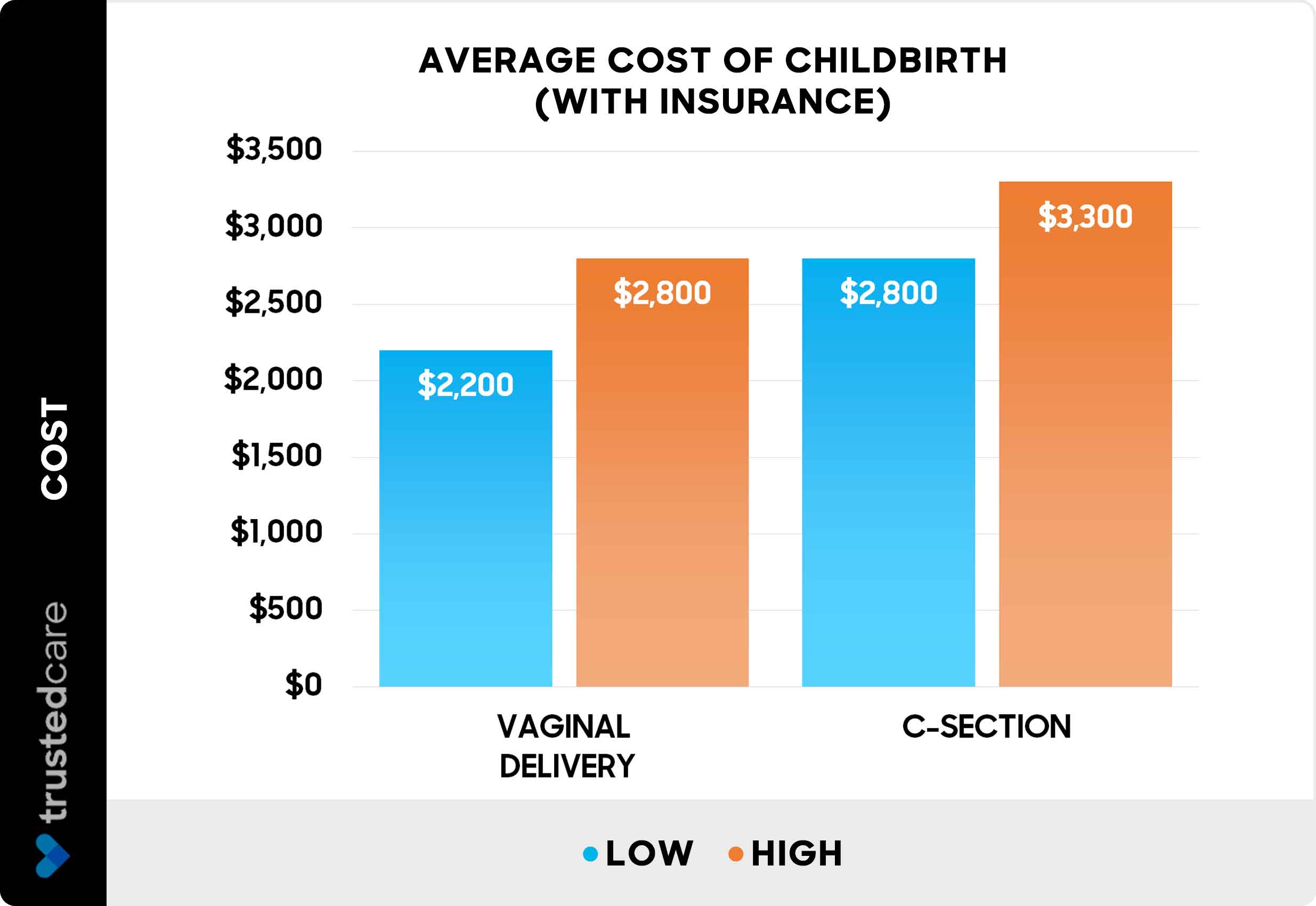
How much does it cost to have a baby?
How much does it cost to have a baby?
$2,200 – $3,300 average childbirth cost with insurance
$10,000 – $26,000 average childbirth cost without insurance
Average cost to have a baby
The average out-of-pocket cost to have a baby with insurance is $2,200 to $2,800 for a vaginal delivery or $2,800 to $3,300 for a C-section, depending on your location, insurance coverage, and if there are complications during childbirth. The average cost to give birth without insurance is $10,000 to $26,000.

| Delivery type | Average cost with insurance | Average cost without insurance |
|---|---|---|
| Vaginal delivery | $2,200 – $2,800 | $10,000 – $15,000 |
| C-section | $2,800 – $3,300 | $15,000 – $26,000 |
Cost to have a baby with insurance
The cost of labor and delivery ranges from $1,300 to $4,700 with insurance, depending on the location, delivery type, and insurance coverage. These aspects of your insurance plan impact your out-of-pocket cost to have a baby:
Deductible – Your deductible is the minimum amount you're required to pay out-of-pocket before your insurance covers medical expenses, and this amount varies by plan. You must meet your yearly deductible before your insurance will cover childbirth costs.
Co-pay – Your co-payment, or "co-pay", is the flat fee you must pay out-of-pocket for hospital and doctor visits and is determined by your insurance plan.
Coinsurance – Some insurance plans require patients to pay a coinsurance amount—a percentage of the provider's or hospital's total fee—instead of a co-pay.
Out-of-pocket maximum – Once you meet your plan's out-of-pocket maximum for the year, your insurance will cover the rest of your health care costs.
In-network vs. out-of-network – When deciding where to give birth, choose a hospital and doctors in your insurance plan's network to minimize your out-of-pocket costs. Most plans cover only a small portion of out-of-network costs, and many plans do not cover them at all.
Common hospital charges related to childbirth include:
Your obstetrician's services
Hospital room and meals
Anesthesiology
Medications, which may include an epidural, other pain meds, or drugs to induce labor
Blood work, radiology, and other tests for you and your baby

Cost to have a baby without insurance
The cost of having a baby without insurance ranges from $6,900 to $29,000, depending on the delivery method, with most people paying around $12,000 for a vaginal delivery and over $15,000 for a C-section. Without insurance, you are responsible for the full cost of the birth and post-partum care for you and your new baby.
How to pay for childbirth without insurance
If you are uninsured, consider these other options to help you cover the cost of having a baby:
Enroll in a health insurance plan if you are within the open enrollment period.
If you're unable to afford insurance through the health marketplace, you may qualify for coverage through Medicaid.
Check with your state's Children's Health Insurance Program (CHIP) to see if you're eligible for coverage, as some states also cover pregnancy and childbirth costs.
Contact the Division of State and Community Health office in your location to find out if you're eligible for assistance through the Title V Maternal and Child Health Block Grant.
Ask the hospital and your OB/GYN if they offer discounted rates for patients without insurance. Most hospitals will negotiate healthcare costs.
Ask the hospital's billing department for a copy of their Financial Assistance Policy. Apply for financial assistance if you qualify.
Can you get insurance while pregnant?
Yes, you can get health insurance while pregnant. Pregnancy does not block your eligibility for new insurance, but you can only enroll during the open enrollment period—which begins on November 1st and runs through early-December—or if you qualify for a special enrollment period (SEP).
Childbirth cost factors
Your insurance coverage and location are the two biggest factors impacting the cost to have a baby. However, these other factors also influence your total cost:
Delivery type
Vaginal delivery costs less than a cesarean birth (C-section). Without insurance, the average C-section cost can run 20% to 30% more. Costs for a C-section are higher because delivery requires an operating room, surgeon, and anesthesiologist and requires a longer hospital stay.
Hospital vs. birthing center or home birth
Costs are typically lower at a birthing center than a hospital, if covered by your insurance. Home birth is another low-cost option but comes with higher risks. Some insurance companies cover only a small portion of the costs of a home birth or don't cover home births at all.
Mother's health
Health conditions like diabetes, obesity, and high blood pressure often cause complications that increase childbirth costs by $1,000 to $2,000 or more.
Talk with your OB/GYN during your prenatal appointments to determine if any existing health conditions are likely to increase your risk of complications during pregnancy and childbirth, and if so, how to prevent those complications.
Prenatal care
If your pregnancy is low risk and your health is normal, you'll have 10 to 15 prenatal visits with your OB/GYN. You may need to see your doctor more often during your pregnancy if you're over 35, overweight, have an existing health condition, or are pregnant with twins or other multiples.
Other prenatal costs include blood work, ultrasounds, and other lab tests, along with prenatal vitamins.
Additional childbirth costs
When bringing your new baby home, you'll also need a car seat, bassinet or crib, nursing and feeding equipment, diapers and changing supplies, and other baby gear. Check out our guide about the average cost to have a baby per month for a list of the expenses you should expect.

Childbirth costs by state
The cost of having a baby varies significantly depending on your location. Childbirth costs are lowest in Mississippi and Arkansas and highest in California, New York, and Alaska. The table below shows the average delivery cost by state with and without insurance.
| With insurance | Without insurance | |||
|---|---|---|---|---|
| State | Vaginal delivery | C-section | Vaginal delivery | C-section |
| Alabama | $1,997 | $2,570 | $9,985 | $14,280 |
| Alaska | $3,318 | $5,198 | $16,590 | $28,875 |
| Arkansas | $1,428 | $1,890 | $7,140 | $10,500 |
| Arizona | $1,848 | $2,892 | $9,240 | $16,065 |
| California | $3,507 | $4,668 | $17,535 | $25,935 |
| Colorado | $2,415 | $3,837 | $12,075 | $21,315 |
| Connecticut | $3,234 | $4,120 | $16,170 | $22,890 |
| District of Columbia | $2,814 | $3,534 | $14,070 | $19,635 |
| Delaware | $2,772 | $3,818 | $13,860 | $21,210 |
| Florida | $2,751 | $3,553 | $13,755 | $19,740 |
| Georgia | $2,541 | $3,402 | $12,705 | $18,900 |
| Iowa | $1,764 | $2,570 | $8,820 | $14,280 |
| Idaho | $2,058 | $3,289 | $10,290 | $18,270 |
| Illinois | $2,058 | $3,024 | $10,290 | $16,800 |
| Indiana | $2,268 | $3,308 | $11,340 | $18,375 |
| Kansas | $1,764 | $2,438 | $8,820 | $13,545 |
| Kentucky | $1,785 | $2,344 | $8,925 | $13,020 |
| Louisiana | $1,806 | $2,268 | $9,030 | $12,600 |
| Massachusetts | $2,877 | $3,837 | $14,385 | $21,315 |
| Maryland | $2,835 | $3,194 | $14,175 | $17,745 |
| Maine | $2,604 | $4,007 | $13,020 | $22,260 |
| Michigan | $1,911 | $2,703 | $9,555 | $15,015 |
| Minnesota | $2,415 | $3,629 | $12,075 | $20,160 |
| Missouri | $1,764 | $2,287 | $8,820 | $12,705 |
| Mississippi | $1,386 | $1,777 | $6,930 | $9,870 |
| Montana | $2,289 | $3,534 | $11,445 | $19,635 |
| North Carolina | $1,911 | $2,797 | $9,555 | $15,540 |
| Nebraska | $1,911 | $2,911 | $9,555 | $16,170 |
| New Hampshire | $2,625 | $3,440 | $13,125 | $19,110 |
| New Jersey | $3,108 | $3,875 | $15,540 | $21,525 |
| New Mexico | $1,953 | $2,892 | $9,765 | $16,065 |
| Nevada | $2,121 | $2,873 | $10,605 | $15,960 |
| New York | $3,402 | $4,404 | $17,010 | $24,465 |
| Ohio | $2,058 | $2,552 | $10,290 | $14,175 |
| Oklahoma | $1,638 | $2,211 | $8,190 | $12,285 |
| Oregon | $3,066 | $4,574 | $15,330 | $25,410 |
| Pennsylvania | $2,457 | $3,213 | $12,285 | $17,850 |
| Rhode Island | $2,793 | $3,213 | $13,965 | $17,850 |
| South Carolina | $2,163 | $2,986 | $10,815 | $16,590 |
| South Dakota | $2,037 | $3,175 | $10,185 | $17,640 |
| Tennessee | $2,226 | $2,835 | $11,130 | $15,750 |
| Texas | $1,848 | $2,495 | $9,240 | $13,860 |
| Utah | $1,932 | $2,930 | $9,660 | $16,275 |
| Virginia | $2,373 | $3,232 | $11,865 | $17,955 |
| Washington | $2,856 | $4,045 | $14,280 | $22,470 |
| Wisconsin | $2,520 | $3,988 | $12,600 | $22,155 |
| West Virginia | $2,898 | $3,610 | $14,490 | $20,055 |
Source: Health Care Cost Institute: Price of Childbirth in the U.S. (No reported data available for Hawaii, North Dakota, or Wyoming.)
FAQs about the cost to have a baby
How can I save money on childbirth?
Follow these tips to save money on having a baby:
Review your insurance plan in advance to confirm which maternity and delivery costs it covers and what your financial responsibility will be.
Compare the delivery costs at several nearby hospitals and birthing centers.
Select an OB/GYN and hospital in your insurance company's network.
Consider using a midwife if your pregnancy is low risk.
Choose generic, over-the-counter prenatal vitamins instead of prescription vitamins.
Look for free community-sponsored childbirth classes.
What is the cheapest way to give birth?
A home birth is the cheapest way to give birth, as you'll save on hospital fees. However, home births present more risks, and some insurance companies do not cover the costs. Consult a licensed midwife or doula for information if you're considering giving birth at home.
Do all health insurance plans cover maternity care?
Yes, all qualified health insurance plans must cover maternity care, including prenatal, childbirth, and newborn care services. However, co-pays and deductibles vary by plan.
Will my health insurance cover my newborn baby?
If you already have health insurance, your plan will typically cover your baby for the first 30 days of life as long as you add your baby to the plan during that time.
You must enroll your baby in your insurance plan within the first 30 days for coverage to apply retroactively to the date of birth and for it to continue after day 30.